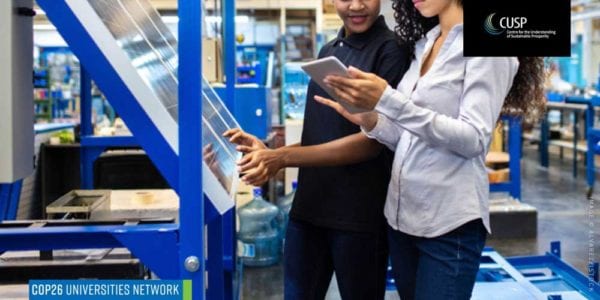Making skills central to the net zero journey
The UK’s education system is far short of being fit for purpose for the goals we now must meet, Joan Walley writes: As wide scale skills deficits needs to be urgently tackled to get to net zero, our latest briefing with the Aldersgate Group is well positioned to “become the standard ‘textbook’ for all stakeholders in education, business and Government.” This blog first appeared on the Aldersgate Group website.

Growing up in the northernmost tip of Staffordshire, we studied the Anglo Saxon settlements and agricultural systems one term and all about the North Staffordshire coalfield the next. Finding out about coal made a lot of sense to those of us in a mining community living side by side with the pits and the slag heaps which scarred the landscape and determined local health, culture and livelihoods.
Fast-forward 60 years and plans are afoot in the southern part of the North Staffordshire Coalfield to recycle and reuse a former power station for a zero-carbon, purpose-built community. New homes will be built to high energy efficiency standards, with new jobs in smart energy and a 20% net biodiversity gain from a nature reserve alongside the river Trent. In the middle of the site there will be a new school, all primed to reflect environmental sustainability in its design, operation, curriculum and outreach.
While it is reassuring to witness the wheel in Staffordshire turn full circle from the agricultural, the industrial and now to the net zero revolution, I am all too keenly aware that, however important, this is just one site. If we are to move on from fossil fuels and meet the challenges of net zero emissions and biodiversity gain, the time is right to urgently put the spotlight on how education is the missing link in the jigsaw to achieving our climate change and biodiversity commitments.
The stark reality is that our education system is far short of being fit for purpose for the goals we now must meet. This is why I am so hopeful that the Aldersgate Group’s latest report, Upskilling the UK workforce for the 21st century, will become the standard ‘textbook’ for all stakeholders in education, business and Government.
Based on the experience of our members, and developed out of our awareness of the gaps in fiscal, regulatory, investment and skills policy, it argues that post COVID-19 recovery must ensure that workers are equipped with the skills necessary to get them back into meaningful employment in the short term, in addition to giving them with the skills that are required for jobs in the future as the UK accelerates the transition towards a net zero economy.
The briefing outlines how low carbon investments will create great opportunities to tackle existing inequalities, build a more competitive economy, and reenergise declining sectors of UK industry. It identifies key priorities for upskilling the workforce—such as embedding sustainability and net zero delivery across the entire education system, requiring FE and HE institutions to develop Skills Action Plans, updating teaching standards, reintroducing mandatory carbon reporting for universities, and introducing new qualifications to encourage retraining. It calls for a National Skills Commission to work with a national skills fund, and for a government plan to set out a clear policy framework alongside the Industrial Strategy to incentivise innovation in all parts of the UK, including the parts of the country most in need of regeneration.
BEIS minister Kwasi Kwarteng’s keynote introduction at the launch of our report gave added weight to its recommendations. I know from the input of Aldersgate Group’s members, including the panellists at our launch event, that they understand the urgency of addressing the UK’s skills challenge with a cross governmental and cross-sectoral effort. This means ministers in all departments, including at DfE, coming on board alongside education providers, investors and employers. It means local authorities and LEPS coming together to develop the local education policies their localities need.
Judging from the interest in our report so far, the Aldersgate Group is in prime position to help reset the role of education so it becomes pivotal to achieving the zero carbon and nature objectives. The momentum created at our launch event has to be carried forward. There, our panellist Iain Patton from the Alliance for Sustainability Leadership in Education referenced John Dewey: ‘If we teach today’s students as we taught yesterday’s students, we rob them of their tomorrow.’
This quote has never been more apt, and I look forward to engaging with a range of stakeholders in the months to come on this important agenda, sharing the lessons of our report and collaborating to make real and lasting progress.



